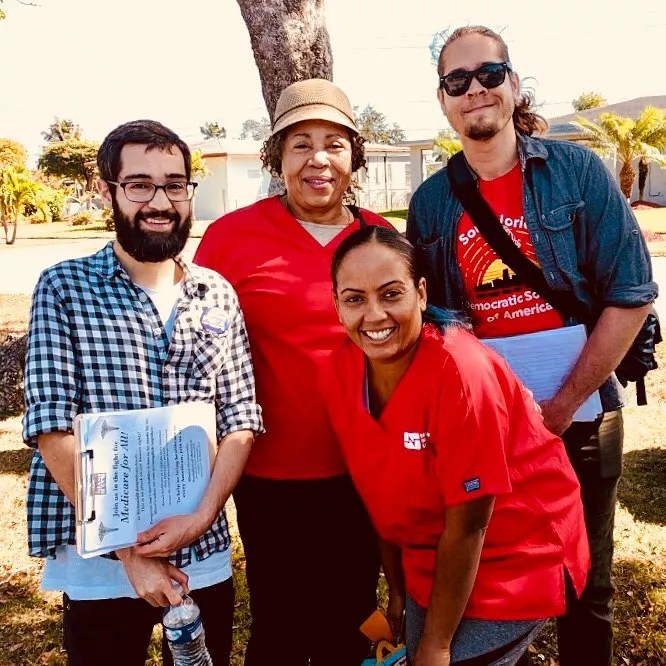
Photo by Andy G / Flickr

Audio By Carbonatix
Saturday afternoon, activists, politicians, and local residents gathered at a baptist church in South Miami-Dade to hear about an unlikely Miami subject – the Medicare for All Act – from an even less likely local political faction: the Democratic Socialists of America (DSA).
The motley group formed in 2017 as part of a wave of post-Trump leftists organizing across the nation, but there can’t be many cities where their message is a harder sell than the 305, where “socialism” still borders on swear word among waves of Cuban exiles and baby-boomer retirees with fresh memories of the Cold War.
But the group’s leaders argue that if people can look past the labels, the DSA’s message should resonate among Democrats in a city where health-care costs are spiraling out of control – and where the GOP’s goal of ending Obamacare could leave hundreds of thousands without any coverage at all.
“Health care shouldn’t be merely ‘affordable,'” says Charles Allen, an active member of the Miami chapter. “It’s a human right which should be provided free at the point of service. When we demand ‘Medicare for All,’ we must mean everyone – it must include mental health care, reproductive health care, and provide coverage regardless of immigration status.”
The DSA movement is still very small, even with a post-Trump boom. Since November 2016, the number of local chapters nationally has increased from a few dozen to 181. Members of the Miami group range from students at Florida International University to nurses and public schoolteachers.
This weekend, the group staged a panel discussion in working-class Richmond Heights, where many residents are uninsured and have explicitly requested increased access to facilities. The DSA didn’t talk much about socialism or try to recruit people to the larger cause.
Instead, it brought together former Florida state Sen. Dwight Bullard, United We Dream activist Maria Bilbao, National Nurses United representative Millicent Bowerbank, and Miami midwife Jamarah Amani, who phoned in from a live birth, to discuss a health-care plan that would work for everyone and how to push for it in Florida.
“From the day we’re born, we all need health care,” Bowerbank says. “We come into the world with a nurse delivering us. We grow up, we give birth, we get sick, we have accidents, we fall, we sustain injuries, then we die. Everyone needs health care, and it’s inhuman to deny it.”
South Florida might not seem like a realistic battleground for single-payer health care. Rick Scott in 2011 turned down millions of dollars in free federal money and last week tried to slash the amount of time Floridians have to apply for Medicaid, in a move that, even in Scott’s best estimate, will affect 39,000 people.
U.S. Sen. Bill Nelson, although onboard with Obamacare, has not come out in favor of a universal system. (which isn’t shocking because he’s accepted hundreds of thousands of dollars in health insurance industry donations). Nelson’s colleague and Poland Spring spokesperson Marco Rubio has called Bernie Sanders’ proposed universal system a “disaster.”
But members of the DSA don’t see the mainline Democratic Party as an entirely unrealistic home for some of their ideas, especially single-payer Medicare for All. Many big-name Democrats are already onboard with Sanders’ Senate Resolution 1804 for single-payer. Seven Florida Democrats in the U.S. House have cosponsored former Congressman John Conyers’ Resolution 676 (now led by Keith Ellison), which proposes a similar plan.
“Unfortunately, if you live in Miami-Dade,” Bullard told the room, “only one of your elected officials wants you to have free health care.” (That would be Rep. Frederica Wilson.)
But the panelists noted the approaching 2018 midterms have opened small windows for somewhat-socialized medicine to sneak into the conversation. It’s already finding a niche in the race to replace GOP Rep. Ileana Ros-Lehtinen, who is retiring.

Millicent Bowerbank (center) and members of Miami Democratic Socialists of America.
Courtesy Miami Democratic Socialists of America
Michael Hepburn, a young Miami native running for the Democratic nod, made universal health care one of his key platform concerns. And Florida state Rep. David Richardson endorsed Medicare for All in a January op-ed for the Miami Herald.
Likewise, Scott’s bid to oust Nelson has left the governor’s seat vulnerable to Democratic poaching. Of the six contenders for the state’s executive office, Tallahassee Mayor Andrew Gillum has come out in support of Sanders’ Medicare for All Act.
There are also other Florida candidates in favor of single-payer, although their chances are slimmer than those in races without incumbents: Tamika Lyles, challenging Bill Nelson in the Democratic primary for Senate; Tom Wells in Congressional District 3; Monica DePaul in Congressional District 4; and Chardo Richardson in Congressional District 7.
Single-payer has advocates in the Florida Legislature as well. State Rep. Annette Taddeo told the town hall in Richmond Heights about the bill she sponsored in Tallahassee to put Medicaid expansion and universal coverage on Florida’s ballot. If the state Senate wins a few more Democratic seats, Taddeo says the legislation could gain more traction.
The town hall was sparsely attended, and the chances of single-payer hitting Florida are still slim. But the DSA argues that polling shows single-payer isn’t a niche issue on the national stage: A March poll by YouGov revealed that health care is the most important issue for voters in the 2018 midterms, and a recent survey by the Kaiser Foundation showed that slightly more than half of voters approve of the idea of a single-payer system, compared to 43 percent who disapprove.
“If everyone cast their ballot,” Bullard said to the room of residents, “we could see some real change.”
Correction: Due to an editing error, this story earlier incorrectly reported that Richardson had dropped out of the Democratic primary for the 27th District. He remains in the race.